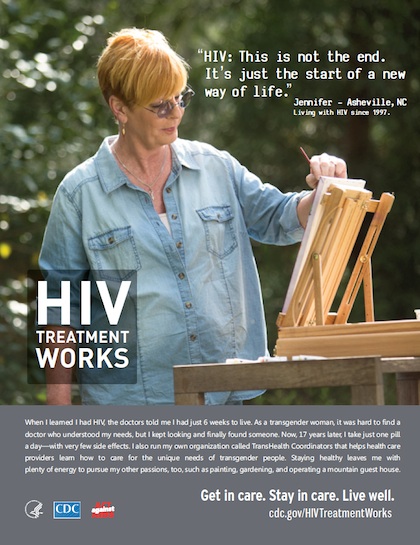 |
| Jennifer Barge |
The CDC launched a new HIV awareness campaign this past September, "HIV Treatment Works!" The campaign is the first of its kind, utilizing the stories and faces of people who are living with HIV and are on treatment for the condition. Fifteen people across the country were chosen to share their challenges and successes with staying in treatment for HIV. The campaign will feature print ads for magazines, posters and billboards. Participants also created public service announcements which will be hitting cable stations over the next few months.
As a local resident of Asheville, North Carolina, and a longtime survivor of HIV/AIDS, I was thrilled to be asked to be one of the 15 people nationwide to take part in the campaign. It is a groundbreaking project showing that an HIV/AIDS positive diagnosis does not have to be the end, but instead the disease can be managed and risk of transmission can be diminished. The campaign urges people, who have HIV to seek medical care, start taking medications and adhere to treatment. I was pleased to bring national focus to North Carolina, especially the western part of the state as we are continually over-looked for funding in regard to HIV/AIDS.
 |
By choosing me, the CDC for the first time also chose to use a transgender person as a spokesperson. As a transwoman who survived an AIDS diagnoses about 18 years ago, when I was told I would be dead in about four weeks, this campaign is important because the stigma related to both HIV and transgender people is commonplace in my life. The fact that the CDC wanted to use my face and voice to help educate others is a milestone for the HIV/AIDS communities and the transgender community. It has been my work for the past eight years to help normalize the mainstream perception of what transgender is by being out and open about my gender status, while also being open about my HIV status and bringing the topic of HIV/AIDS to any venue that I can. I feel this campaign is another way for me to dissolve the stigma of HIV and help normalize the mainstream idea of what transgender is.
More than 1.1 million people in the United States are infected with HIV, the virus that causes AIDS. Southern states now have the highest rates of new HIV diagnoses, the largest percentage of people living with the disease and the most people dying from it, according to Rainey Campbell, executive director of the Southern AIDS Coalition, a nonprofit group serving Washington, DC, and the 16 Southern states. Fifty percent of all new HIV cases are in the South. These states also have the highest fatality rates from HIV in the country, according to the Southern AIDS Coalition.
I always tell people that knowledge is power and to know your status by getting tested. Also be responsible with everything that you do — use clean needles, never share needles and use protection with all forms of sex. If you do not know your status and would like to be screened for HIV, then contact an AIDS service organization, most of which offer free testing or can link you to free testing.
Jennifer Barge is the director of TransHealth Coordinators in Asheville, North Carolina.






Comments
Comments